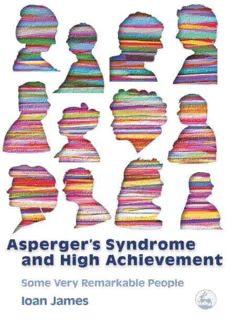
Asperger's Syndrome And High Achievement: Some Very Remarkable People PDF
Preview Asperger's Syndrome And High Achievement: Some Very Remarkable People
Asperger’s Syndrome and High Achievement of related interest The Genesis of Artistic Creativity Asperger’s Syndrome and the Arts Michael Fitzgerald ISBN 1 84310 334 6 Different Like Me My Book ofAutism Heroes Jennifer Elder Illustrations by Marc Thomas and Jennifer Elder ISBN 1 84310 815 Bright Splinters of the Mind A Personal Story ofResearch with Autistic Savants Beate Hermelin Foreword by Sir Michael Rutter ISBN 1 85302 932 7 pb ISBN 1 85302 931 9 hb An Exact Mind An Artist with Asperger Syndrome Peter Myers, with Simon Baron-Cohen and Sally Wheelwright ISBN 1 84310 032 0 Asperger’s Syndrome A Guide for Parents and Professionals Tony Attwood Foreword by Lorna Wing ISBN 1 85302 577 1 Asperger’s Syndrome and High Achievement Some Very Remarkable People Ioan James Jessica Kingsley Publishers London and Philadelphia First published in 2006 by Jessica Kingsley Publishers 116 Pentonville Road London N1 9JB, UK and 400 Market Street, Suite 400 Philadelphia, PA 19106, USA www.jkp.com Copyright © Ioan James 2006 The right ofIoan James to be identified as author ofthis work has been asserted by him in accordance with the Copyright, Designs and Patents Act 1988. All rights reserved. No part ofthis publication may be reproduced in any material form (including photocopying or storing it in any medium by electronic means and whether or not transiently or incidentally to some other use ofthis publication) without the written permission ofthe copyright owner except in accordance with the provisions ofthe Copyright, Designs and Patents Act 1988 or under the terms ofa licence issued by the Copyright Licensing Agency Ltd, 90 Tottenham Court Road, London, England W1T 4LP. Applications for the copyright owner’s written permission to reproduce any part ofthis publication should be addressed to the publisher. Warning: The doing ofan unauthorised act in relation to a copyright work may result in both a civil claim for damages and criminal prosecution. Library ofCongress Cataloging in Publication Data James, I. M. (Ioan Mackenzie), 1928- Asperger's syndrome and high achievement : some very remarkable people / Ioan James. p. cm. Includes bibliographical references and index. ISBN-13: 978-1-84310-388-2 (pbk. : alk. paper) ISBN-10:1-84310-388-5(pbk.:alk.paper) 1. Asperger'ssyndrome.2. Geniusandmental illness. 3. Creative ability--Psychological aspects. 4. Asperger's syndrome--Patients--Biography. 5. Autism--Patients--Biography. I. Title. RC553.A88J35 2006 362.196'858832--dc22 2005029311 British Library Cataloguing in Publication Data A CIP catalogue record for this book is available from the British Library ISBN-13: 978 1 84310 388 2 ISBN-10: 1 84310 388 5 ISBN pdfeBook: 1 84642 452 6 Printed and bound in Great Britain by Athenaeum Press, Gateshead, Tyne and Wear Contents Preface 7 Introduction 9 1. MichelangeloBuonarroti (1475–1564) 15 2. PhilipofSpain(1527–1598) 23 3. IsaacNewton(1642–1727) 33 4. JonathanSwift(1667–1745) 45 5. JohnHoward(c.1726–1790) 53 6. HenryCavendish(1731–1810) 63 7. ThomasJefferson(1743–1826) 69 8. VincentvanGogh(1853–1890) 77 9. EricSatie(1866–1925) 89 10. BertrandRussell(1872–1970) 97 11. AlbertEinstein(1879–1955) 107 12. BélaBartók(1881–1945) 117 13. Ramanujan(1887–1920) 125 14. LudwigWittgenstein(1889–1951) 133 15. AlfredKinsey(1894–1956) 143 16. SimoneWeil(1909–1943) 155 17. AlanTuring(1912–1954) 167 18. PatriciaHighsmith(1921–1995) 177 19. AndyWarhol(1928–1987) 183 20. GlennGould(1932–1982) 195 Conclusion 203 Bibliography 219 Acknowledgments 224 Preface This book contains profiles of twenty very remarkable people. Five camefromBritain,fourfromAmerica,twofromFrance,andoneeach from Austria, Canada, Germany, Hungary, India, Ireland, Italy, the Netherlands and Spain. One was king of Spain, another president of the United States. Three were artists, three were musicians and three werewriters;thereweretwophilosophersandonephilanthropist.The others were scientists: three physicists, two mathematicians and one biologist.Atfirstsightallthesepeopleseemtohavelittleincommon exceptforstrangeidiosyncrasies,ofthekindassociatedwiththemild form of autism known as Asperger’s syndrome (AS for short). As the psychologistRosemaryDinnagehassaid,perhapsthecurrentinterest in the syndrome springs from some withdrawn but unrecognised streak in all of us. Hans Asperger, a Viennese paediatrician, thought that for highly intelligentpeopleatraceofautismcouldbeessentialtosuccessinthe artsandsciences.HebelievedthatthetypicalAspergertraitsofperse- verance,driveforperfection,goodconcreteintelligence,abilitytodis- regardsocialconventionsandunconcernabouttheopinionsofothers could all be seen as advantageous, possibly a prerequisite for certain kinds of new thinking and creativity. Those who have the syndrome often feel as if they are on the wrong planet, and yet some of these ‘strangersontheearth’haveachievedsomuch.Itmustbeemphasised that only a small minority of people with Asperger’s have both the ability and the opportunity to excel. Wherever possible I have quoted from the relevant literature. In psychiatry there are differences of opinion which hardly concern us 7 8 Asperger’sSyndromeandHighAchievement here, although disagreement suggests the need for caution. The profilesarenotmeantascasestudies.Readerswhowishtoknowmore willfinddetailsinthebooksandpaperscitedinthereferences.Among the psychologists and others who have kindly helped me in various ways,forexamplebysuggestingpossiblesubjectsforprofiles,Iwould particularly like to thank Simon Baron-Cohen, Michael Fitzgerald, Uta Frith, Gaie Houston, Mark Houston, Viktoria Lyons, Michel Treisman, John Tyrer and Rachel Warner. Introduction Autism, so far as we know, has always existed, in every period and culture. It is interesting to try to identify well-known people of the pastwhodisplayedsomeautistictraits.Sometimesthesecorrespondto adisorderontheautisticspectrum,suchasAsperger’ssyndrome,and theremaybeadiscussionofsuchcasesintheprofessionalliterature.In someinstancesthereisdisagreementamongtheexpertsastowhatthe disorder is or was involved. Setting such questions to one side, it is interestingto review thefascinating life storiesof thesevery remark- ablepeople,highlightingthepatternsofbehaviourthatpsychologists regardassignificant,andthateveryonewouldregardasextraordinary. In Autism:ExplainingtheEnigma, Uta Frith (2003) discusses some his- toricalcases,suchasthetwelfth-centuryItalianBrotherJuniper,oneof the original followers of Saint Francis of Assisi. Challis and Dewey (1974) maintain that some of the ‘blessed fools’ of Old Russia may have been autistic too. Michael Fitzgerald has proposed the early English scientist Roger Bacon and several others. There must have beenplentyofothercases,buttherightkindofbiographicalinforma- tionisnoteasytofind.Theclassicaltypeofautisminvolveslowintelli- gence,significantlearningdisabilities,memorybyrote,literalnessand arigidinsistenceonsameness.However,autismisaspectrumofdisor- dersof development,onlysomeof whicharesodisablingastomake normal life impossible. The psychological, emotional and cognitive characteristicshavebeenshowntohaveabiologicalbasis,evenifthat is not yet well understood. The disorder has strong genetic roots. At leastathirdofparentsofchildrenwithAsperger’ssyndromewillhave at least some related symptoms. 9
Description: